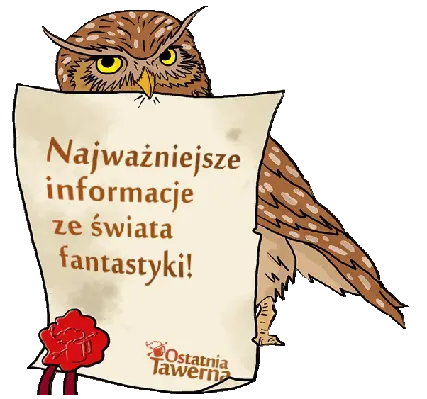In the world depicted, definitely not, but we as readers have nothing to fear. Although the title is not for everyone and undoubtedly has several weaknesses, it can easily compete with the works of widely read foreign authors from the plot of horror. What is impressive here is not only the length and complexity of the plot, which is unusual for a novice writer, but also the amount of work that had to be put into such a meticulous reproduction of the real reality of Wrocław – both today and in the past, known as “Breslau”, visible to the naked eye.
What not to do, where not to go …
In fact, the plot is quite simple – Dariusz Drzewiecki, an almost stereotypical Polish entrepreneur in his forties, has a well-prospering bar, a loving wife and a friend who runs a renovation company. Perfect, it would seem, conditions for a peaceful life and further professional development, i.e. opening another place. The choice falls on the spacious cellar “with traditions”, ie the underground of the New Stock Exchange, which once housed an exclusive restaurant famous for its delicious veal. At the beginning, everything goes downhill: we manage to buy the seat, renew it at a bargain price (thanks to the contacts already mentioned), hire additional employees and the business can be in full swing as an attractive Golden Calf pub.
There is only one minor drawback – a small, concrete room in the back, intended for the back room, in which many people hear strange sounds, feel an unpleasant, putrid smell, and sudden drops in temperature. In fact, peace seems to have a negative impact on everyone, causing anxiety, bad dreams, irrational suspicion towards friends and colleagues, and even outbursts of uncontrolled aggression. And all this, regardless of whether we see the source of these things in this bizarre room, or we blame the whole thing down to an unpleasant coincidence. This place scares some people, fascinates others, and for the rest it remains just a gloomy cellar at the back of the pub, but one thing is certain – there is no escape from its operation.
A galaxy of personalities, each with a transition
W trakcie lektury dość prędko rzuci nam się w oczy, iż autorowi donikąd się nie spieszy, przez co nie ma żadnych oporów, by obszernie zaprezentować nam przeszłość i ogólny światopogląd wszystkich ważniejszych bohaterów. Od pewnego momentu widać wręcz schemat, w którym każda kolejna postać przejmująca pałeczkę jako „oczy i uszy” czytelnika serwuje nam długi monolog wewnętrzny na temat tego, jakie miała dzieciństwo, co myśli o tym i o tamtym, a także jak znalazła się w obecnym punkcie swojego życia. Narracyjnie wybija to nieco z rytmu i sądzę, że można było przeprowadzić tego rodzaju ekspozycję trochę inaczej, niemniej jednak jest ona obecna, dzięki czemu nie mamy problemu ze zrozumieniem zachowań poszczególnych osób – przynajmniej na początku.
Tak też dowiemy się, że Drzewiecki był w dzieciństwie świadkiem utonięcia, a w chwili otwarcia opowieści jest zapracowanym, sprytnym biznesmenem o zaleczonych już kłopotach małżeńskich; główny barman Bartosz Długowski to pewny siebie, energiczny i uczciwy facet, od czasu śmierci młodszego brata borykający się jednak z samotnością i skłonnością do używek; kolejna barmanka, Marzena Janicka, to dziewczyna osierocona w młodym wieku i wychowana przez babcię – oschłą i surową dewotkę; menadżerka Golden Calf, Marcelina Kubicz jest byłą alkoholiczką przekuwającą swój dawny nałóg w obsesyjny pracoholizm… i tak dalej. Wszyscy oni prędzej czy później dostają swoje „pięć minut”, co pomaga pogłębić ich charaktery i umieścić ich wzajemne relacje w centrum uwagi (przynajmniej częściowo), co stanowi ostatecznie jedną z mocniejszych stron powieści.
Mimo wszystko jednak, o ile tego rodzaju skrócone opisy mogą ich prezentować jako osoby całkiem sympatyczne, jakimi zresztą w większości są na początku historii, o tyle obecność mrocznej energii w przedwojennych podziemiach bardzo szybko zaczyna zniekształcać ich osobowości, wyciągając na wierzch to, co najgorsze. Z każdą przewróconą kartką jest zatem coraz trudniej utożsamiać się z którymkolwiek z głównych bohaterów czy też kibicować im w ich poczynaniach. Wzajemne złośliwości, intrygi, sekrety i uprzedzenia wzbierają w nich niczym nieczystości w niedrożnym kanale ściekowym, a my możemy jedynie na to patrzeć i czekać na nieuniknione.
Wciągająca opowieść podszyta przytłaczającym pesymizmem
Sama fabuła prezentuje się naprawdę dobrze. Powieść miewa tu i ówdzie problemy z utrzymaniem przyzwoitego tempa ze względu na rozwlekłe opisy i nieco zbyt obszerne szkatułkowe historyjki z życia pobocznych postaci, ale jest to jedynie niewielka niedogodność spowodowana, jak sądzę, pisarską manierą autora, z której być może zdoła się wyleczyć wraz z nabywanym doświadczeniem. Mimo to szkielet całej historii, jak i sposób jej podania – miejscami bezpośredni i naturalistyczny, kiedy indziej zaś chaotycznie oniryczny – stoją na wysokim poziomie, wzbudzają ciekawość i zachęcają do dalszej lektury. Należy przy tym zaznaczyć, że Możdżeń dość często kreuje tu obrazy makabryczne, odrażające i gorszące, więc czytelnicy o słabszych żołądkach i nader plastycznych wyobraźniach powinni mieć się na baczności!
The only thing that, upon reflection, I consider to be a problem with this story is its final meaning. As the author himself states in the afterword, he is a lover of horror movies of all kinds and was primarily intended to write a book that he would like to read himself, and he thought less about whether the whole would convey a deeper message. I am sure that he succeeded in one hundred percent of this basic idea – Come with me is indeed a pleasure to read, and I also have no doubts that the title is suitable for returning to it after some time. Unfortunately, there is also less attention to the “moral” of this work, although not in the most obvious way.
The problem is not that there is no message, because this novel cannot be called shallow or nonsensical. Rather, the point is that, left alone, it has wandered in a direction it probably shouldn’t. You probably know many stories about people fighting the demons of the past, who, after many hardships and moments of doubt, find the strength necessary to “go forward” and become better persons, right? Well, this is not one of them.
For the heroes of Come with Me, doom is almost a lifetime of fate, and the evil forces from the underworld are able to gain access to their souls thanks to even one unlucky event from the distant past, still alive in the depths of their minds. So everything is doomed; the game was lost before it began, and the characters cannot escape their own faults and weaknesses, no matter what their efforts. This perspective is simply depressing, and the following scenes of the symbolic “fall” of the protagonists one after another can really lower the mood of the recipient, causing a sense of melancholy and the unpleasant senselessness of human efforts. Therefore, when reaching for this title, it should be borne in mind, especially now, in the era of pandemic unrest and the so-called seasonal depression, inherently associated with autumn.

